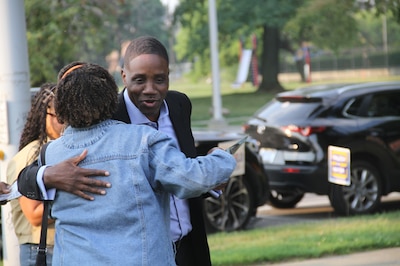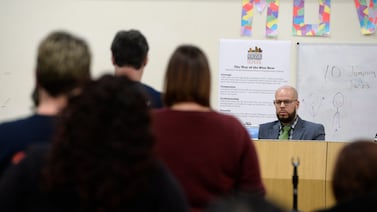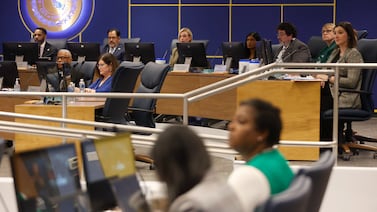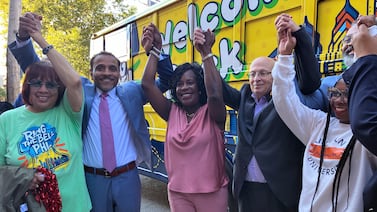Sign up for Chalkbeat Detroit’s free newsletter to keep up with the city’s public school system and Michigan education policy.
The two contenders to be Detroit’s next mayor both say they will invest city resources into addressing chronic absenteeism, one of the biggest challenges facing schools in the city.
Mary Sheffield, the president of the Detroit City Council, and Solomon Kinloch, the senior pastor at Triumph Church in Detroit, were the top vote-getters in the mayoral primary in Detroit Tuesday and will face off in the general election in November.
Just 17% of Detroit residents voted in the primary election, according to city of Detroit data. Sheffield, who led polling throughout the campaign, received 43,572 votes, or 51% of the vote. Kinloch came in a distant second, with 14,893 votes, or 17.4% of the vote.
They were among a field of nine candidates who said they intended to play a role in collaborating with schools across the city and improving outcomes for young people.

The desire to get involved in education issues is happening at a critical moment in the city. Low academic achievement and high rates of chronic absenteeism are among the biggest challenges schools face. But contributing factors such as poverty, housing instability, transportation, and safety concerns — issues schools alone can’t resolve — impede school success for many students.
There has been a growing realization among many community leaders that the city’s rebirth from bankruptcy won’t be complete if schools continue to struggle, and student achievement won’t see substantial improvement if the city doesn’t partner with the education community.

So what would the two mayoral contenders do?
In her response to a Chalkbeat Detroit survey on education issues, Sheffield said her role would “be a solutions-oriented advocate on behalf of parents, teachers, students and community members.” She said she would “commit significant resources” toward improving conditions that impact education that the city oversees.
“I will establish deeper collaborative ties with DPSCD first and foremost, acknowledging that a strong school system means a strong Detroit,” Sheffield said. “Everything from Detroit’s public safety to workforce to small business and entrepreneurship have direct ties to our educational system. So as a goal, we will understand the gaps and create solutions together.”
Kinloch, who didn’t respond to Chalkbeat’s survey, told the Detroit News that he would be an “educational mayor” and would appoint a chief educational officer who would work with Detroit school officials.
On his website, Kinloch said he would partner with Detroit’s school community to address social barriers to education.
The person he would appoint to the senior cabinet level position would be “specifically tasked with working with our school administrators, educators, parents, and children to coordinate city services that support student success.”
Both candidates say they would tackle attendance challenges. In the Detroit Public Schools Community District, about 60% of the students were considered chronically absent during the last school year. That’s down from a high of nearly 80% at the height of the pandemic, but still far above state and national averages. Charter schools have similarly high rates. A student is considered chronically absent if they miss 10%, or 18 days, of the school year.
“Together, we will attack the root causes of truancy, such as housing instability, financial need, lack of transportation, and mental health, and set our students up for success,” Kinloch wrote on his website. “My administration will prioritize it, set metrics to track progress and keep us accountable.”
Sheffield said attendance and literacy rates must be addressed together.
“We have to make sure that we are having conversations about both, because they are inevitably linked. And possible solutions have to take this into account as well,” Sheffield said in her response to the Chalkbeat survey.
“If students are not showing up to school consistently, we are not able to accurately gauge the quality of the educational system itself,” she said. “I am committing to piloting realistic wraparound services solutions that include transportation, housing, employment and childcare supports to our students and households with the highest barriers to attendance.”
Lori Higgins is the bureau chief for Chalkbeat Detroit. You can reach her at lhiggins@chalkbeat.org.





